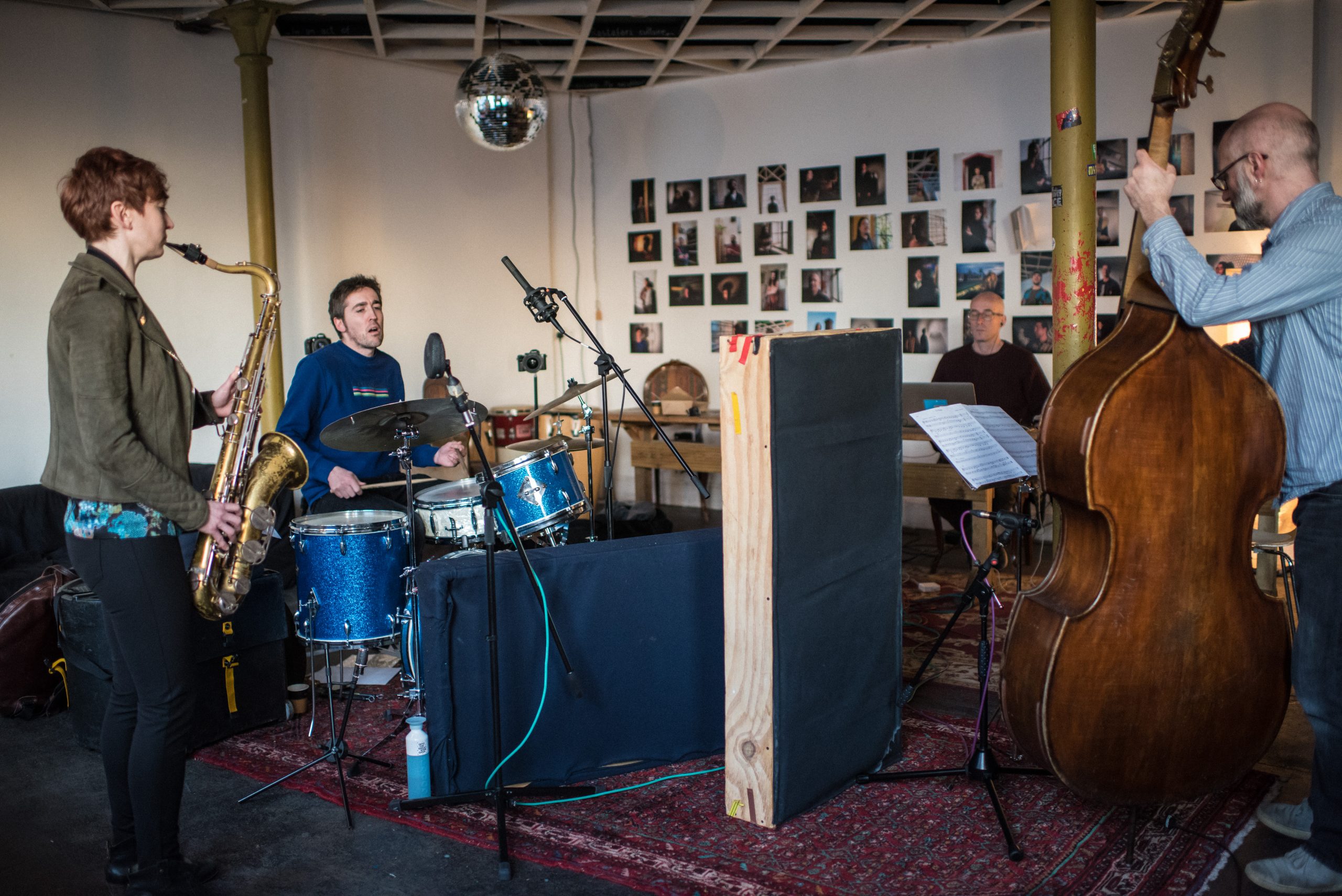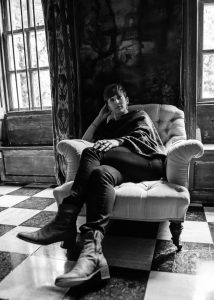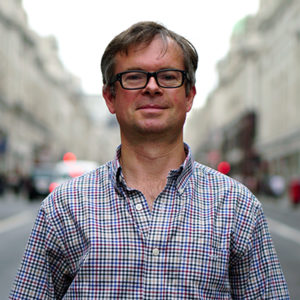Josephine Davies Interview

Saxophonist and composer Josephine Davies spoke to Charlie Anderson about her move to Hastings and her recent Jazz South commissioned piece.
You recently performed your Jazz South Radar Commission piece. How did that come about?
I saw their website not too long after moving down to Hastings and it struck me as something that would really tie in with a compositional direction that I was moving in already. So when I got down here, which was April this year, I started listening to a lot of orchestral music and learning to write for strings, and then looking further into various woodwind sections and orchestral sections, and then this Radar Scheme came up. Obviously they wanted a trio or ‘a composition for up to three musicians’ but I thought it would be really nice to do something with some instruments that aren’t just primarily jazz instruments. So the inspiration came really from what I was already doing, which was really looking into particularly the bass clarinet. That was an automatic ‘yes, I definitely want that in the mix’, and then a feeling of ‘what other instrument can go with bass clarinet and saxophone that has a big dynamic range and has a big range in itself and can do lots of things, like play legato and percussively? The piano immediately ticked all of those boxes, and I hadn’t played with Alcyona Mick for a while and thought it would be a really great opportunity to write something for her. So that was the instrumentation influence, and then I thought it would make sense to write something about the sea and about moving back down here, possibly a sense of homecoming, a sense of being out of the city and back by the sea.
How do you know the other musicians, Tamar Osborn and Alcyona Mick?
Tamar and I go way back. We were actually at Junior Guildhall together a long time ago, then we were at Guildhall together, and then we played together in lots of different combinations over the past 15 years. I’m in her band Collocutor, which is world music and jazz. She’s just moved to St. Leonards as well.
Alcyona I know primarily from doing the London Jazz Orchestra, and then she joined my trio Orenda which is with vocalist Brigitte Beraha. We’ve played loads over the past five or six years. It made sense to have her because she is such an incredibly dynamic and diverse musician and comes up with these amazing spontaneous, and quite orchestral, soundscapes.
That was really wonderful to play with those two, and they are amazing musicians. It’s quite an involved piece. The first rehearsal that we had, I thought it might take quite a lot of time putting it together and trying out things, but it was just immediately really solid, which is testament to their musicianship.
What else have you been doing this year?
Lots of things. My most recent project is something that I’m excited about. It’s a collaboration between me and my partner Ben Somers, who is a bass player (amongst other instruments). We’ve written loads of stuff together during lockdown, because we’d moved in together. We’re friends with the guitarist Phil Robson and his partner, vocalist Christine Tobin, so Ben and I just started thinking ‘you know what, most of the pieces that we’re writing would sound really good with vocals and guitar’. So we got in touch with Phil and Christine and we said ‘let’s all write a piece, then we can record it remotely’. We’re trying to get it all together for next week, for the first BandCamp Friday of December. So that’s been really great.
[The end result was the Two Cities EP, released on Bandcamp on 4th December, 2020 available here]
I’ve been getting into writing for strings, so I’ve written a string quartet, which is hopefully going to be rehearsed soon because there’s actually a string quartet that’s getting together in Hastings led by Kate Robinson who is the leader of the Heritage Orchestra. She lives down here and it was her idea initially to get a bunch of jazz musicians to write something for string quartet, because that would give the quartet a slightly different, unique flavour. It hasn’t really been done that much before. So I’ve written a string quartet and I’m hoping to write some more for that.
The Jazz South Radar Scheme has been really inspiring for me, Alcyona and Tamar, so I want to write a set’s worth of music for us to perform next year to a live audience, when that becomes possible.
So you studied at The Guildhall and you started out in classical music?
Yes, I did. It wasn’t so much a choice, I just ended up there on the classical saxophone course. I don’t really know how I ended up there. The original plan was to be an actor, and then my best friend, who is an opera singer, went to Guildhall and I thought ‘oh, I’ll do that as well’.
I didn’t apply for the jazz course because I hadn’t ever played any jazz before, so by default I went on the classical course and then realised that I really didn’t like it. It wasn’t for me at all so I had to go about learning enough jazz on my own in order to ask to join the jazz course. And obviously they were quite reluctant to do so because I was way below the skill level of the jazzers that were already on the course because they’d been learning jazz for a few years and were already technically accomplished. So that was quite a difficult time. When I got there, not only did I think ‘I don’t want to do classical saxophone’ but I heard some jazz and thought I really want to do that. It was a kind of wilful ‘this must happen’ even if it takes a lot of work, which it did.
Were there any particular breakthrough moments that you remember?
Well it’s funny. My first influence was quite 1960s based. At that time I heard some John Coltrane and Sonny Stitt and was trying to learn that kind of language to play jazz. I think my first breakthrough moment where I thought ‘yes, I kind of understand how this is supposed to happen’ was through listening to Kenny Wheeler and playing his music with some people at Guildhall, which was probably only a few months after I’d started learning jazz. It just made more sense to me than the more traditional structured standards-based pieces of music. It was very free-flowing and melodic, and that made more immediate sense to me, without having to linearly think it through. I was immediately able to do something with it, able to make my way through these pieces of music without having to worry too much about whether I was playing the right language or not. That was my first breakthrough moment and probably something that influenced my eventual movement into becoming a contemporary improvising jazz musician (or improvisor). I don’t quite know what to call myself but I’m definitely not a hard bop saxophonist or something like that.
When you graduated from the Guildhall, how did you find it in terms of being out in the ‘real world’?
Really difficult, actually. I was mainly teaching and doing function gigs with some not great quality function bands. I was still practicing but when I was at Guildhall I didn’t really get a band of my own together and I didn’t really get involved in enough other projects. So I was quite on my own in a way that lots of other musicians aren’t when they leave music college. I think I really struggled for a few years to really justify why I was doing what I was doing, and how I could make it work. Actually, the first band that I really got together I was in my late twenties, which is relatively late, I think, to become a bandleader, if that’s what you’re ultimately going to do. So I hadn’t written music before then, I hadn’t really formulated what kind of jazz I wanted to play. I definitely didn’t have a sense of my own sound, or even what kind of music I was interested in. I was just flailing around trying to find something, for quite some time, which is unusual but not unheard of. I think about people like Joe Lovano who was probably just a sideman until he was in his late thirties, and then found his own voice. So there are people who have done it like that. Then it became a bit clearer to me, as soon as I became a bandleader, what it was that I wanted to do and how I wanted that to sound and it was just a really gradual, slow process of making that happen, and allowing that to happen.
In terms of playing the saxophone, and trying to improve your playing, are there specific things that you’re working on?
Interestingly, I feel it’s more important for me to work on my musicianship and that comes through a lot of ear training, a little bit of transcription, listening to totally different music and composition. I then trust that that process will merge into my saxophone playing.
As a saxophonist specifically, I work on being able to articulate my ideas so there is a technical process in that, and there’s also something about working on my own sense of time so that the more solid I am within time itself, the more permutations of rhythmic ideas I can articulate, the freer I can become to make lots of different choices, and not play any of the things that I’ve worked on and be completely free within the music and be able to respond to what’s happening around me. So it’s a bit more of an over-arching idea of being an accomplished musician rather than an accomplished saxophonist, which is perhaps different from other saxophonists. I do more practice away from the saxophone than on the saxophone.
Is there anything else that you’d like to talk about?
I’m really pleased that Whirlwind have managed to release the album on schedule. We recorded it in January 2020 and the original date for release was October 9th and then coronavirus happened and lockdown and I thought ‘we won’t be able to do anything with this, it’ll have to wait’. But Whirlwind have been amazing and made that release happen so it still feels like things are happening below the surface. I’ve been very fortunate in many ways: being a composer I’m used to working in isolation, living with my partner Ben who is a musician so we’ve played tons of music together, and having lots of great original projects that I’m involved with. I’ve been able to keep going. There hasn’t, for me, been a total shutdown of creativity and I think that’s really important at this time that people do find a way to maintain their sense of why they do what they do and how they do it. For jazz musicians especially, it’s often that we work only in tandem with other musicians and our creativity is built around other musicians. But during this time we have to find different ways of expressing ourselves and offering that to the community that we’re involved with. Otherwise it’s really deadening and numbing, and that’s not a good place to be in, especially as a creative person. It’s anathema to us.
Are there any other projects that you’re working on?
I’m still working on my main project, Satori. We just released a new album on Whirlwind Recordings and we were supposed to be touring now and throughout the autumn. Obviously that’s not happening, but we are doing our album launch in January. I’m trying to write some new music for us, and obviously rehearsals are still allowed to go ahead so we’re getting together soon, which is going to be amazing.
I’m doing lots of writing, big and small. I’ve just applied for funding to remotely record my jazz orchestra throughout the spring. That’s something that I’m trying to think about – how we will do that, who will be involved, and finalise some writing for that as well. So I’m keeping busy, in essence.
Josephine Davies launches her Satori album How Can We Wake? at Jazz In The Round on Monday 25th January.
For tickets to watch the live stream of the album launch at Jazz In The Round click here.
For more information on Josephine Davies: https://www.josephinedavies.co.uk/
Photos: Monika S. Jakubowska
This interview appeared in the January 2021 issue of Sussex Jazz Magazine. To subscribe click here.




